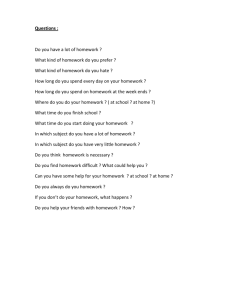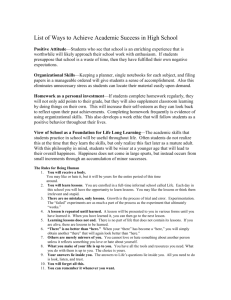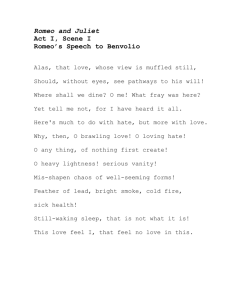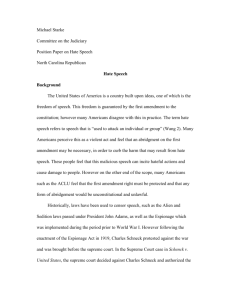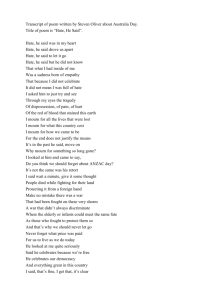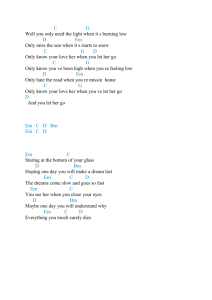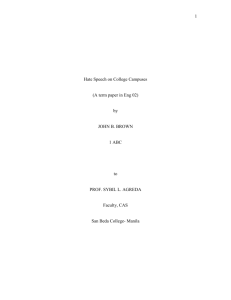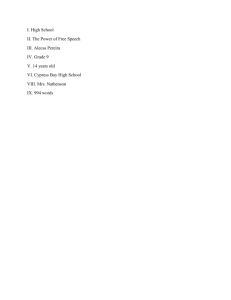Hate speech, n. – Bigoted speech attacking or disparaging a social
advertisement
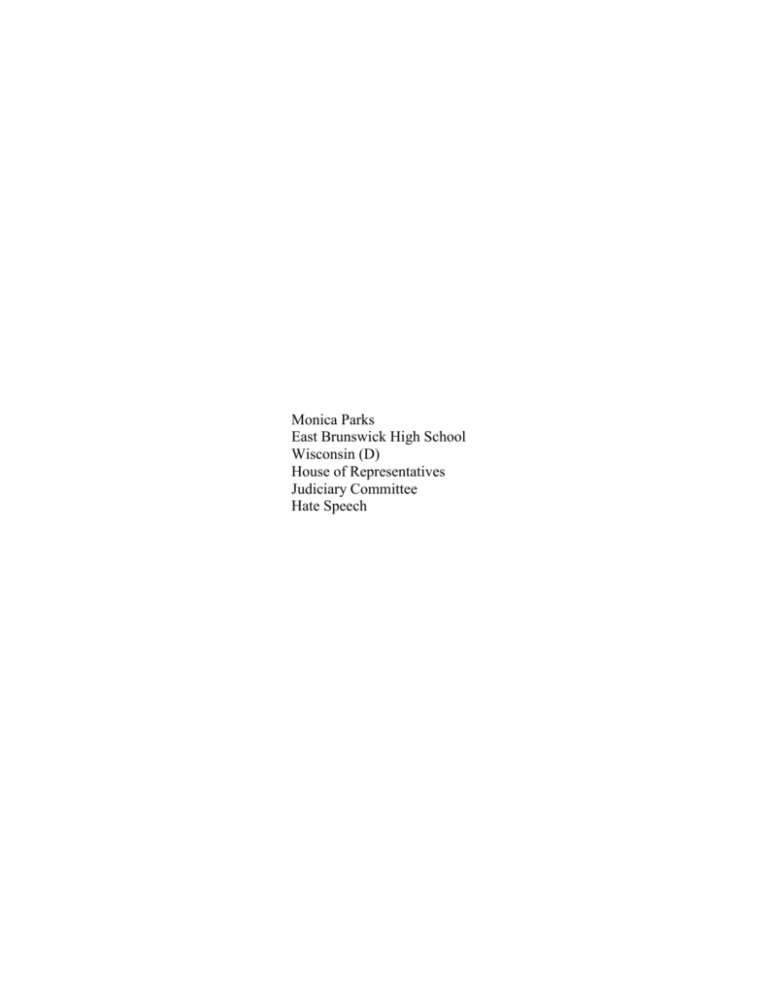
Monica Parks East Brunswick High School Wisconsin (D) House of Representatives Judiciary Committee Hate Speech Hate speech, n. – Bigoted speech attacking or disparaging a social or ethnic group or a member of such a group (Merriam-Webster Dictionary of Law). Images of burning crosses, swastikas, and violent "fighting words" come to mind when hate speech is mentioned. Conversely, hate speech in the real world also occurs less dramatically – anywhere from a crude hand gesture to a whispered slur. However hate speech offends its victims, it is nevertheless protected by the Constitution. Abridging the right to freedom of expression not only impairs the rights of the prejudiced, but it also weakens the rights of those who simply want to express themselves. Limiting the freedom of speech will only harm American freedom. To preserve the liberty that American citizens cherish, the Committee on the Judiciary must vote to defend the right to express oneself. The Supreme Court has been confronted frequently with cases regarding hate speech. R.A.V. v. Saint Paul is perhaps one of the most controversial to date. Robert A. Victoria burned a crude cross on the lawn of an African-American family (http://www.law.umkc.edu/faculty/projects/ftrials/conlaw/hatespeech.htm). They argued that their actions were protected by the first amendment. However, the Court disagreed – symbols like the burning cross are only constitutional when displayed publicly, such as in a demonstration or a rally. When they encroach on private property, it is considered a crime. This case brought to attention the fact that the term hate speech is not limited to verbal attacks. The issue of spoken hate was addressed in Chaplinsky v. New Hampshire, in which Walter Chaplinsky, a Jehovah's Witness, verbally attacked a town marshal, calling him "damned Fascist." His remarks were deemed fighting words, defined by the Merriam-Webster Dictionary of Law as "words which by their very utterance are likely to inflict harm on or provoke a breach of the peace by the average person to whom they are directed." The Supreme Court must continue to defend the First Amendment, as they have done for so many in the past. The Constitution of the United States is the first to spring to the defense of freedom of speech. Its controversial first amendment states that "Congress shall make no law […] prohibiting the free exercise thereof; or abridging the freedom of speech." It is this clause that has brought so many, fleeing tyranny, to the United States. However, this right is continually threatened, especially on college campuses. Freedom of speech on campus is strongly supported by many prominent organizations, including the American Civil Liberties Union. The ACLU "believes that all campuses should adhere to First Amendment principles because academic freedom is a bedrock of education in a free society" (http://www.aclu.org/studentsrights/expression). In the past, attempted solutions proved unsuccessful. The most futile were campus speech codes, which in turn worked against those they tried to protect. The failure of these codes was due to the fact that " "the ultimate power to decide what speech is offensive and to whom rests with the authorities – the government or a college administration – not with those who are the alleged victims of hate speech" (http://www.aclu.org/studentsrights/expression). The best remedy for a situation such as this is to fight back with speech alone. On campus students should create workshops to raise awareness about bigotry, the true cause of hate speech. Past events demonstrate that speech regulation is not the solution for intolerance in the United States. In many European countries, hate speech has been banned. As a result of this, there has been a steady rise in bigoted crimes. The only explicable reason for this is the fact that if people are banned from expressing themselves verbally, they will find another way to convey their beliefs. In Germany, anti-Semitic and xenophobic attacks spiked in 2002. Anti-Semitic incidents are up in Italy and Belgium, while in France the number of anti-Semitic attacks increased dramatically. In England, anti-Semitic complaints have increased nationwide (http://www.time.com/time/magazine/). One of the most tragic was the 2003 burning of the Merkaz HaTorah Jewish School in Gagny, France. There are currently no suspects in the arson of the yeshiva – however, in the preceding months; students at the Merkaz HaTorah had been harassed on the subway, called "dirty Jews" by teens of Arab and North African descent. The fire shocked the citizens of Gagny, condensed by the words of math teacher Michaël Mimoun: "We were in a very calm place here, a privileged place. Now we know there is no privileged place." The citizens of the United States have always cherished their right to freedom of expression. In limiting this, they will only find other ways to communicate their thoughts. The obvious solution is to allow citizens to continue expressing themselves – in allowing people to exercise their first amendment rights; it will facilitate the government in monitoring those who may commit hate crimes in the future. The Committee on the Judiciary must take the lead in defending the First Amendment. Works Consulted "Hate Speech on Campus." Online. Internet. http://www.aclu.org/studentsrights/ expression/12808pub19941231.html. 30 March 2007. Lee, Martin A. " With Times Tough, Fascism Coming Back." Los Angeles Times, 21 September 1997. " Notable First Amendment Court Cases." Online. Internet. http://www.ala.org/ala/oif/firstamendment/courtcases/courtcases.htm#ffe. 26 March 2007. "R.A.V. v. City of St. Paul, Minnesota." Online. Internet. http://www.bc.edu/bc_ org/avp/cas/comm/ free_speech/rav.html. 2 April 2007.
